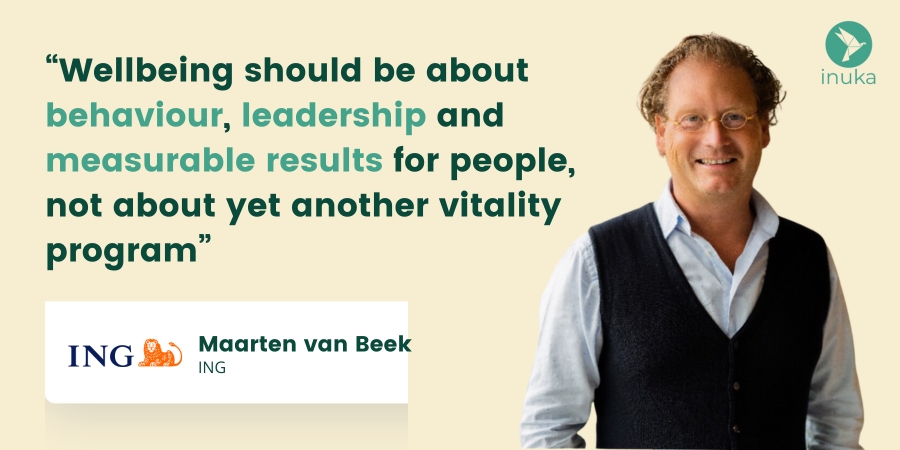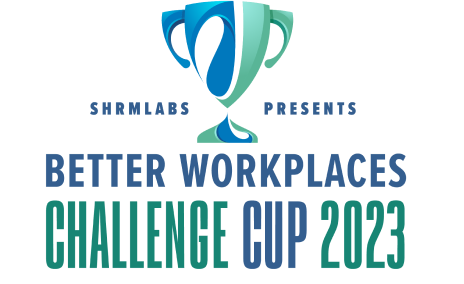“Wellbeing should be about behaviour, leadership and measurable results for people, not about yet another vitality program”: Insights from ING’s Maarten van Beek on employee well-being.

Maarten van Beek, HR Director for ING Benelux, highlights the importance of holistic well-being, advocating for a flexible approach that aligns with life stages, and underscores the need for genuine connections and individual-centered solutions in the evolving work landscape.
Maarten, you’re an MT member and HR Director for ING Benelux, and serve on multiple boards. Can you introduce yourself, ING, and your role there?
Yes, of course. I joined ING about six years ago and have deep expertise in HR. Currently, I hold the position of HR Director for the Benelux region. The workforce exists of 20,000 people. My background includes organisational psychology, among other things. Besides my work at ING, I’m also a board member at NPO (Dutch public broadcasting organisation), Cordaid, Dutch association of employers, and Leiden University Fund. Last but not least, I’m also involved in activities related to refugees and student refugees. I enjoy the diversity of responsibilities.

How did you become personally interested in wellbeing?
I find the 4 generational working population intriguing. These days, people work until an average age of 67. It’s quite strange, considering my grandparents, for example, retired at 50. Their work in the mines in Limburg was physically tough. However, work nowadays is tough in a different way, often more mentally demanding than physically. I think working is like sports – recovery and rest are crucial in sports, and working towards something leads to a better performance. I believe that we should organise work more around life and life stages.
From a personal perspective, Covid had a significant impact on my lifestyle. I had more time to lead an active lifestyle and I enjoyed that. I become more fit and lost quite a bit of weight -a nice side effect. It made me feel better and gave me more energy, as well as a personal drive to support others.

Congrats on your fitness journey! The concept of organising work around life and life stages is an interesting one, can you elaborate?
Sure, consider the works of Dirk de Wachter, a man I’ve had the opportunity to engage with on several occasions. His perspective resonates with a broader global sentiment—a desire for improvement and enhancement. Society has ingrained in us the notion that progress should always equate to more, and this relentless pursuit has become the norm. Our careers, traditionally depicted as linear ladders, could also be seen as different, more diverse paths, which can be equally fulfilling.
In this context, the discussion naturally extends to exploring options like a universal basic income or innovative compensation structures within organisations. For instance, within a company, each employee might receive a fixed salary but could earn more by taking on additional responsibilities or exceeding certain performance thresholds. However, there should still be a safeguard in place—a minimum standard of living within these companies. The broader question arises: how can we ensure that individuals can continue working comfortably until the age of 67, or engage in alternative pursuits?

Have you been able to implement some of this thinking at ING?
Within ING, we’ve introduced an initiative that allows employees to devote a day to paid volunteer work starting at the age of 60. This initiative serves a dual purpose: to offer individuals a sense of purpose beyond their roles within the bank and to help them transition into a post-working phase, a period that often poses challenges for many.
To me, well-being fundamentally revolves around how we can maintain our mental and physical health throughout our lives, including during retirement. This isn’t a responsibility that should solely rest upon the shoulders of employees; rather, it should be a joint effort. Companies should make the pursuit of well-being attractive and perhaps provide incentives to support employee endeavours.
Naturally, it’s a complex matter. Consider, for example, an individual struggling with weight issues who may be hesitant to join a gym. The initial step is often daunting. Can employers play a role in addressing this? Officially, the answer may be no, but there’s room for constructive conversation. The same applies to addressing smoking and other unhealthy habits.
Well-being is also about the room to flexibly organise your daily life. At ING we operate in an agile and hybrid manner. This means we spend an average of two days a week at the office, which give our employees that needed flexibility.
At the same time, although the sickness rate at ING is currently quite low, I’ve noticed that people feel an increased mental ‘burdened’ of their workload compared with before COVID. In the end it’s all about perception. It might not actually be true that work pressure has increased, but the perception is there, and that perception is of course real.

You mentioned employees experiencing an increased mental burden post CVOID. How do ING support in these instances?
We have interventions for people who are having a tough time. But granted, it’s a tough subject. People don’t easily share about mental health issues. How do we normalise talking about it? I think we’re getting better at it, but we’re still far from where we should be.
At the beginning of the COVID crisis, the Dutch Minister of Health, Bruno Bruins, collapsed because he couldn’t cope with the pressure. It was such a pivotal moment. It showed that it can happen to anyone. We all have our breaking point.
ING provide a range of offerings aimed at enhancing well-being. These include both individual coaching and group coaching sessions focused on vitality. Additionally, we have implemented a distinctive program known as “Purpose to Impact.” This initiative centres on grounding individuals and forging a connection between their personal purpose and ING’s overarching mission, giving tangible benefits. We’ve observed a reduction in sick leave and a boost in employee satisfaction among those who have engaged with it.
This outcome aligns with a fundamental principle—when individuals possess a clear personal purpose that harmonises with the organisation’s mission, the synergy often translates into higher performance. Moreover, it’s gratifying to witness these positive outcomes reflected in concrete data and metrics.
Finally, we’re introducing what we call “Healthy Working Habits.” Microsoft, for example, ensures that emails don’t go in or out of your inbox after 6 p.m. or before 8 a.m., etc. Personally, I don’t believe in that approach. I value my flexibility; I don’t want to go back to an eight-to-five schedule. But that doesn’t mean someone else should feel compelled to work according to my schedule, so you need to make agreements about that.

What do you consider to be the biggest well-being priorities at ING?
One of the key priorities lies in engaging those segments of our workforce who might not inherently prioritise well-being and mental health. Another challenge is fostering open discussions about mental well-being, which also entails establishing a safe and supportive work environment. We know it’s still quite challenging, but it’s also actually quite simple – it’s just about creating and fostering real connections. This becomes slightly more intricate when you operate in a hybrid manner.

How do you personally navigate between passion and work life balance?
When I’m passionate about something it usually gives me a lot of energy. I perform at my peak when things get hectic. When it’s too quiet, you tend to slack off a bit. But it’s also true that when you’ve been working really hard on something, it’s also important to be able to take a long weekend off.
As someone belonging to the generation of relatively young parents – my oldest child is 12 – I’ve experienced the challenges of juggling various responsibilities. While it has its enjoyable aspects, it also raises questions about how we collectively navigate these demands. Hence, for 2023, my aspiration and challenge are to re-evaluate our perception of work.

Where do you get your well-being inspiration from? Are there people you follow, books you read, or podcasts you listen to that you could recommend to other HR professionals?
I participated in my first vitality program at Unilever with Tignum, and it was fantastic. It focused on recovery and nutrition. This was 15 years ago, so what’s considered normal now was not back then. They introduced for instance simple morning yoga activities, to open up your body. I still read a lot from Tignum. Other than that, I listen to podcasts and observe what’s happening around me. If I learn that a certain company has implemented a process or strategy that helped them, I want to know everything about that and find ways to replicate that.

In your opinion, where do you foresee significant changes in the field of wellbeing, employee wellness, and vitality in the years to come?
My hope for change lies in shifting our perspective towards a more harmonious way of integrating our lives, as I mentioned earlier. The term “work-life balance” is commonly used, but I find it somewhat misleading. It implies the need for a strict equilibrium, whereas what’s truly important is finding a balance that adapts to our various life phases. For instance, you might decide, “I want to prioritise my career at this point,” but it should be balanced with another phase where you say, “I want to be present for my children or provide caregiving,” which is becoming increasingly significant.
To accommodate these evolving needs, we must explore new approaches and, crucially, place individuals at the centre of these considerations. It’s a matter that requires thoughtful deliberation. I’ve observed that in the past, many companies used to offer flexible, in-house childcare solutions. However, with the introduction of new childcare regulations, this practice has mostly been outsourced. Whether one approach is superior to the other is a matter of debate, but the consequences of these changes are evident. Therefore, we must contemplate how any key changes impact on individuals.

Did you like this interview?
Find more interviews with business leaders of various top companies via the button below. Would you like to receive the next interviews in your inbox? You can register below.
Powered by Inuka Coaching, a #BCorp and value-driven organisation. With our roots in research, we lead on evidence-based, digital and data-driven solutions that achieve measurable impact in employee vitality and resilience.
As part of our mission ‘Everyone resilient’, we strive to bring valuable content to advance the strategic thinking in employee well-being and facilitate a vibrant and growing peer network of leaders, because we all learn faster and achieve more together! Join our peer network of leaders focused on Well-being, register here
Find this post interesting? Share it with your connections!



